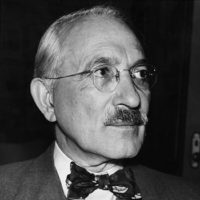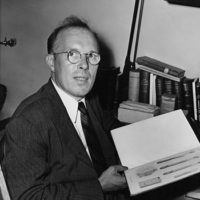
Selman A. Waksman
Rutgers University

René J. Dubos
The Rockefeller Institute
For studies of the antibiotic properties of soil bacteria leading to the discovery of streptomycin.
René Dubos and Selman Waksman
The value of man’s health and well-being of fundamental research is well exemplified by the researches of Selman Waksman and of René Dubos, recognized throughout the world for their outstanding contributions to science.
Their studies on the relations of association and antagonism of mixed microbiological populations of the soil have not only contributed to our basic knowledge of bacterial metabolism, but also have demonstrated the antibiotic properties of soil bacteria of immediate value to man.<
Dr. René Dubos, applying the principle of enrichment of soil with pathogenic bacteria, isolated a spore-forming bacterium capable of bringing about lysis of certain gram-positive organisms. He first isolated from the spore-forming bacteria specific crystalline substances such as tyrothricin that are powerful bacterial antagonists, thus contributing materially to the subsequent development in the field of antibiotics.
Dr. Selman Waksman’s studies on the microorganisms of the soil have led to the discovery of a host of antibiotics, among them streptomycin, one of the most potent available to medicine today. It has permitted successful treatment of diseases due to bacteria which are resistant to penicillin. It also affects the growth and viability of the tubercle bacillus and favorably influences the course of some clinical varieties of human tuberculosis (TB).
Particular emphasis is given to this joint award in that deaths in 1946 from tuberculosis alone claimed 50,000 persons, and disabilities from various forms of TB are estimated at 680,000. It is the seventh-ranking killer disease in the US, but in many other countries the disease is far more widespread with greater death and disability rates, particularly after World War II. Of note is the fact that approximately $1,613,000 is available yearly for research in the field of tuberculosis, the number one cause of death among persons from 15 to 44, in contrast to $123 million spent for its control and cure in a recent year. Meanwhile, other medical workers are continuing to explore new uses for the drug as treatment for TB and undulant fever, and the search for newer and better antibiotics to supplement those isolated by these Lasker Award winners continues.
The studies of René Dubos and Selman Waksman have again emphasized the importance of fundamental research in that, by increasing our knowledge concerning the activities of soil organisms, they have at the same time elucidated roles which microorganisms can play in maintaining the health of man.
